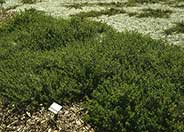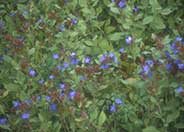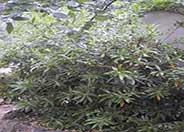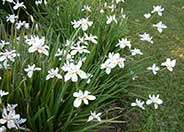
Common name:Coyote Bush
Botanical name:Baccharis pilularis 'Pigeon Point'
'Pigeon Point' is a compact, evergreen ground cover that grows 18"- 24" tall and 10'-12' wide. It is the preferred form of the Coyote Bush. Its leaves are green; it has white flowers that bloom in the fall. It is important to plant this groundcover that are at least 6' -10' apart. Otherwise they will overgrow each other and create a high groundcover. 'Pigeon Point' is tolerant of ocean spray and is deer resistant.

Common name:Arizona Ash
Botanical name:Fraxinus velutina
This rounded tree will grow 30'-50' tall and has glossy, bright green leaves that turn yellow and gold in the fall. The leaves are soft and velvety, and the trunk is slender and gray. This tree is cold hardy to about -10 degrees F.

Common name:Dwarf Plumbago
Botanical name:Ceratostigma plumbaginoides
Intense blue flowers adorn the glossy green leaves of this plant in late summer and fall. This 6" mat-forming ground cover does well in shade or sun, and in average soil.

Common name:Kanooka Box, Water Gum
Botanical name:Tristaniopsis laurina
This slow growing, evergreen, multi-trunked tree is 20' tall and 10' wide. It has a dense, rounded crown with yellow flowers that bloom in late spring, and attractive leaves and bark. It requires regular watering.

Common name:Climbing Rose
Botanical name:Rosa Climbing varieties
With its dark green foliage and fragrant flowers with full and double blooms, this upright shrub is generally grown as a vine or pillar rose. Climbing varieties come in many colors.

Common name:Butterfly-Iris, Fortnight Lily
Botanical name:Dietes iridioides
This clumping evergreen Iris bears tall, narrow leaves to 30" tall and white flowers marked purple in the center on stalks up to 3' tall. This variety has stiffer, darker foliage than the bicolor form. It requires sun to part shade with little or no summer watering when established.
Designer:
Photographer: GardenSoft
Physical weed control, including mulching, or hand removal protects the watershed from harmful chemicals.
Mulching and adding compost to soil can minimize evaporation and help soil absorb and store water.
Drip and other smart irrigation delivers water directly to roots, allowing no excess water for weeds.